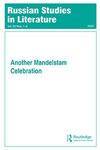Three Commentaries on Poems by Mandelstam
4区 文学
Q4 Arts and Humanities
引用次数: 0
Abstract
Grigorii Kruzhkov examined three of Mandelstam’s poems. First, he identifies the various voices in “The Decembrist” (Dekabrist), arguing that this musical quality is an innovation in M’s poetry. Reading “To Cassandra” (Kassandre), he argues that the order of the stanzas was changed to conceal its counter-revolutionary meaning, nevertheless apparent to the attentive reader who could perform the same reading. Third, in the poem “The Apartment” (Kvartira), he deciphers the significance of “Nekrasov’s hammer,” suggesting that the poet identifies with the boy who is hurt when he jumps on a footboard full of nails rather than with Nekrasov, the earlier poet who condemned this practice, or the fine people riding in the new Soviet carriage of state.曼德尔斯坦诗歌三论
格里戈里·克鲁日科夫研究了曼德尔斯坦的三首诗。首先,他确定了《十二月派》(Dekabrist)中的各种声音,认为这种音乐品质是M诗歌的创新。在阅读《致卡桑德拉》(Kassandre)时,他认为诗节的顺序被改变了,以掩盖其反革命的含义,然而,对于能够进行同样阅读的细心读者来说,这是显而易见的。第三,在诗歌《公寓》(Kvartira)中,他解读了“涅克拉索夫之锤”的意义,表明诗人认同在跳上满是钉子的踏板时受伤的男孩,而不是谴责这种做法的早期诗人涅克拉索夫,或乘坐新苏联国家马车的好人。
本文章由计算机程序翻译,如有差异,请以英文原文为准。
求助全文
约1分钟内获得全文
求助全文
来源期刊

RUSSIAN STUDIES IN LITERATURE
LITERATURE, SLAVIC-
自引率
0.00%
发文量
0
期刊介绍:
Russian Studies in Literature publishes high-quality, annotated translations of Russian literary criticism and scholarship on contemporary works and popular cultural topics as well as the classics. Selections are drawn from the leading literary periodicals including Literaturnaia gazeta (Literary Gazette), Novoe literaturnoe obozrenie (New Literary Review), Oktiabr (October), Voprosy literatury (Problems of Literature), and Znamia (Banner). An editorial introduction to every issue provides context and insight that will be helpful for English-language readers.
 求助内容:
求助内容: 应助结果提醒方式:
应助结果提醒方式:


